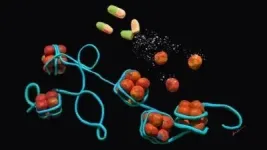(Press-News.org) A new study at the University of Chicago Medicine and Washington University found that a single inhalation session with 25% nitrous oxide gas was nearly as effective as 50% nitrous oxide at rapidly relieving symptoms of treatment-resistant depression, with fewer adverse side effects. The study, published June 9 in Science Translational Medicine, also found that the effects lasted much longer than previously suspected, with some participants experiencing improvements for upwards of two weeks.
These results bolster the evidence that non-traditional treatments may be a viable option for patients whose depression is not responsive to typical antidepressant medications. It may also provide a rapidly effective treatment option for patients in crisis.
Often called "laughing gas," nitrous oxide is frequently used as an anesthetic that provides short-term pain relief in dentistry and surgery.
In a prior study, the investigators tested the effects of a one-hour inhalation session with 50% nitrous oxide gas in 20 patients, finding that it led to rapid improvements in patient's depressive symptoms that lasted for at least 24 hours when compared to placebo. However, several patients experienced negative side effects, including nausea, vomiting and headaches.
"This investigation was motivated by observations from research on ketamine and depression," said Peter Nagele, MD, Chair of Anesthesia and Critical Care at UChicago Medicine. "Like nitrous oxide, ketamine is an anesthetic, and there has been promising work using ketamine at a sub-anesthetic dose for treating depression. We wondered if our past concentration of 50% had been too high. Maybe by lowering the dose, we could find the 'Goldilocks spot' that would maximize clinical benefit and minimize negative side effects."
In the new study, the investigators repeated a similar protocol with 20 patients, this time adding an additional inhalation session with 25% nitrous oxide. They found that even with only half the concentration of nitrous oxide, the treatment was nearly as effective as 50% nitrous oxide, but this time with just one quarter of the negative side effects.
Furthermore, the investigators looked at patients' clinical depression scores after treatment over a longer time course; while the last study only evaluated depression symptoms up to 24 hours after treatment, this new study conducted additional evaluations over two weeks. To their surprise, after just a single administration, some patients' improvements in their depression symptoms lasted for the entire evaluation period.
"The reduction in side effects was unexpected and quite drastic, but even more excitingly, the effects after a single administration lasted for a whole two weeks," said Nagele. "This has never been shown before. It's a very cool finding."
These results indicate promise for nitrous oxide as a rapid and effective treatment for those suffering from severe depression that fails to respond to other treatments, such as SSRIs, a common type of antidepressant medication.
"A significant percentage -- we think around 15% -- of people who suffer from depression don't respond to standard antidepressant treatment," said Charles Conway, MD, Professor of Psychiatry and Director of the Treatment Resistant Depression and Neurostimulation Clinic at Washington University School of Medicine. "These 'treatment-resistant depression' patients often suffer for years, even decades, with life-debilitating depression. We don't really know why standard treatments don't work for them, though we suspect that they may have different brain network disruptions than non-resistant depressed patients. Identifying novel treatments, such as nitrous oxide, that target alternative pathways is critical to treating these individuals."
Despite its "laughing gas" reputation, patients who receive such a low dosage actually fall asleep.
"They're not getting high or euphoric, they get sedated," Nagele said.
While it remains challenging to get non-traditional treatments for depression accepted in the mainstream, researchers hope that these results, and other similar studies, will open the minds of reluctant physicians toward the unique properties of these drugs.
"These have just been pilot studies," said Nagele. "But we need acceptance by the larger medical community for this to become a treatment that's actually available to patients in the real world. Most psychiatrists are not familiar with nitrous oxide or how to administer it, so we'll have to show the community how to deliver this treatment safely and effectively. I think there will be a lot of interest in getting this into clinical practice."
With broader public acceptance, Nagele hopes that these results can open doors for those patients who are struggling to find adequate therapies for their depression.
"There is a huge unmet need," he said. "There are millions of depressed patients who don't have good treatment options, especially those who are dealing with suicidality. If we develop effective, rapid treatments that can really help someone navigate their suicidal thinking and come out on the other side -- that's a very gratifying line of research."
The study, "A Phase 2 Trial of Inhaled Nitrous Oxide for Treatment-Resistant Major Depression," was supported by an Independent NARSAD Investigator Grant from the Brain and Behavior Research Foundation. Additional authors include Frank Brown, Nisha Jain, and Robert Gibbons of UChicago and Ben J. Palanca, Britt Gott, Linda Barnes, Thomas Nguyen, Willa Xiong, Naji C. Salloum, Gemma D. Espejo, Christina N. Lessov-Schlagger, Wayland W.L. Cheng, Helga Komen, Branden Yee, Jacob D. Bolzenius, Alvin Janski and Charles F. Zorumski of Washington University School of Medicine.
INFORMATION:
About the University of Chicago Medicine & Biological Sciences
The University of Chicago Medicine, with a history dating back to 1927, is one of the nation's leading academic health systems. It unites the missions of the University of Chicago Medical Center, Pritzker School of Medicine and the Biological Sciences Division. Twelve Nobel Prize winners in physiology or medicine have been affiliated with the University of Chicago Medicine. Its main Hyde Park campus is home to the Center for Care and Discovery, Bernard Mitchell Hospital, Comer Children's Hospital and the Duchossois Center for Advanced Medicine. It also has ambulatory facilities in Orland Park, South Loop and River East as well as affiliations and partnerships that create a regional network of care. UChicago Medicine offers a full range of specialty-care services for adults and children through more than 40 institutes and centers including an NCI-designated Comprehensive Cancer Center. Together with Harvey-based Ingalls Memorial, UChicago Medicine has 1,296 licensed beds, nearly 1,300 attending physicians, over 2,800 nurses and about 970 residents and fellows.
Visit UChicago Medicine's health and science news blog at http://www.uchicagomedicine.org/forefront.
Twitter @UChicagoMed
Facebook.com/UChicagoMed
Facebook.com/UChicagoMedComer
A single, one-hour treatment that involves breathing in a mixture of oxygen and nitrous oxide -- otherwise known as laughing gas -- significantly improved symptoms in people with treatment-resistant depression, according to new data from researchers at Washington University School of Medicine in St. Louis and the University of Chicago.
In a phase 2 clinical trial, the researchers demonstrated that symptoms of depression improve rapidly following treatment with inhaled nitrous oxide. Further, they reported the benefits can last for several weeks.
The findings are published June 9 in the journal Science Translational Medicine.
"A large percentage of patients don't respond to standard antidepressant therapies -- the ...
A new study unexpectedly identified tiny deposits of elemental copper and iron within the brains of two deceased people with Alzheimer's disease. The findings could help scientists better understand how these elemental metals, which were uncovered in the cores of amyloid plaques, contribute to neurodegenerative diseases and could point to a target for alternative Alzheimer's therapies. While enzymes and proteins containing positively charged copper and iron ions have been known to control key processes in the human brain, little has been known about how the organ mineralizes iron and copper, including the formation of elemental metallic nanoparticles, which ...
(Boston)--Should treatment of alcoholics be different based on gender? Yes, according to a new study that shows that alcoholic men and women respond differently to their disease resulting in different levels of brain activity and brain abnormalities. Research indicates that they distinguish facial expressions differently and that this is an important clue as to how treatment strategies might be tailored.
Chronic long-term Alcohol Use Disorder (AUD) or "alcoholism," is a harmful condition that has been associated with deficits in emotion and memory, including memory for the emotional expressions of faces. In addition to its effects on memory for facial emotions, AUD also has been associated with impairments ...
PSI researchers have developed a new tomography method with which they can measure chemical properties inside catalyst materials in 3-D extremely precisely and faster than before. The application is equally important for science and industry. The researchers published their results today in the journal Science Advances.
The material group of vanadium phosphorus oxides (VPOs) is widely used as a catalyst in the chemical industry. VPOs have been used in the production of maleic anhydride since the 1970s. Maleic anhydride in turn is the starting material for the ...
Widespread adoption of hydrogen-powered vehicles over traditional electric vehicles requires fuel cells that can convert hydrogen and oxygen safely into water - a serious implementation problem.
Researchers at the University of Colorado Boulder are addressing one aspect of that roadblock by developing new computational tools and models needed to better understand and manage the conversion process. Hendrik Heinz, an associate professor in the Department of Chemical and Biological Engineering, is leading the effort in partnership with the University of California Los Angeles. His team recently published new findings on the subject in Science Advances.
Fuel cell electric vehicles combine ...
A single one-hour treatment with nitrous oxide - also known as laughing gas - can relieve symptoms of treatment-resistant depression for several weeks, according to a phase 2 clinical trial involving 28 participants. By showing that a 25% concentration of the gas still has therapeutic effects, the results suggest that lower concentrations of nitrous oxide could be useful against depression in the clinic while bringing a lower risk of side effects. Inhaled nitrous oxide is commonly used as a sedative agent in dental and medical offices, but the gas has also attracted attention as a possible treatment for depression. A previous study showed that nitrous oxide had marked ...
New Curtin research has shown how a readily available, cheap and safe-to-use product found in the medicine cabinet of most homes could be the key to better ecological restoration practices with major benefits for the environment and agriculture.
The study revealed that aspirin, which naturally occurs in the bark of the willow tree and other plants, can improve the survival of grass species important for ecological restoration and sustainable pasture when applied in a seed coating.
Lead researcher Dr Simone Pedrini from the ARC Centre for Mine Site Restoration in Curtin's School of Molecular and Life Sciences, said salicylic acid has been used for its medicinal properties for more than 4000 years and its modern synthetic version, acetylsalicylic acid, or aspirin, is one ...
Our genetic material is stored in our cells in a specific way to make the meter-long DNA molecule fit into the tiny cell nucleus of each body cell. An international team of researchers at the Max Planck Institute for Biology of Ageing, the CECAD Cluster of Excellence in Ageing research at the University of Cologne, the University College London and the University of Michigan have now been able to show that rapamycin, a well-known anti-ageing candidate, targets gut cells specifically to alter the way of DNA storage inside these cells, and thereby promotes gut health and longevity. This effect has been observed in flies and mice. The researchers believe this finding will open up new possibilities for targeted therapeutic interventions ...
BOSTON - A new analysis by researchers at Massachusetts General Hospital (MGH) offers a novel perspective on the disproportionate impact that COVID-19 has had on people of color, low-income populations, and other structurally disadvantaged groups. Their findings, published in a research letter to the END ...
For decades, physicians and dieticians have urged people to limit their intake of high fat foods, citing links to poor health outcomes and some of the leading causes of death in the U.S., such as diabetes, heart disease and cancer.
According to the Centers for Disease Control and Prevention, dietary components high in saturated fats such as red meat are thought to be risk factors for colon cancer. Diet is thought to strongly influence the risk of colorectal cancer, and changes in food habits might reduce up to 70% of this cancer burden.
Other known epidemiological risk factors are family history, inflammatory bowel disease, ...



